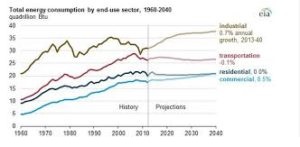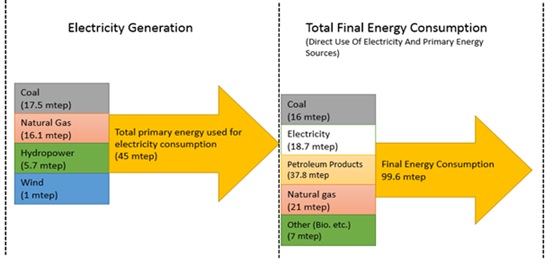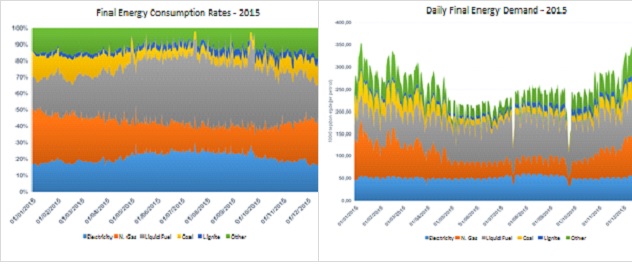 SUMMARY:
SUMMARY:
International Energy Agency’s methodology dictates final energy consumption to include electricity, processed goods, natural gas and other fuels, which makes up the energy consumption that generates economic activity in a country. Calculating final consumption, all units (MWh, tonnes, etc.) are converted to common energy unit of Million Ton Equivalent Petroleum (mtep).
Assuming Turkey’s 2015 final energy balance to be approximately 100 mtep (99.5), the corresponding number for electricity is 18.7, for natural gas is 21, for petroleum products is 37.8, and for coal is 16 mteps. The remaining 7 mteps are biomass, solar heat, and geothermal heat. In electricity, 45 mtep primary energy source is used to produce 18.7 mtep.

Since 2013, a lot of daily data on final energy consumption, including gasoline, is kept on a daily basis. However, the daily consumption in the industry is generally unknown. The Quant group has tried to ascertain the daily energy balance of Turkey by bringing these consumptions (electricity, natural gas, fuel) together with the assumed unknown consumptions.
DAILY ENERGY BALANCE:
In final consumption, the single biggest share in Turkey belongs to fuel oil products. This is followed by natural gas and electricity. When natural gas and electricity are combined, the biggest energy demand stems from heating and transportation.

| 2015 Daily Energy Products Ratio (estimated) | 2015 Daily Final Energy Demand (estimated) |
In 2015, the highest energy demand, in line with the seasonal conditions, was observed in December; and the lowest in the May – June period (due to effective fuel demand of the month of Ramadan).
CONCLUSION:
It will be misleading to study Turkey’s energy demand solely based on electricity. Additionally, it will be misleading to study security and supply from a single dimension. In some ways, energy companies can also be considered companies operating within the heating (more broadly climatization) and transportation services. The best hedging mechanism for companies with long-term targets in the Turkish energy sector is to have a combined oil and natural gas with partial inclusion of electricity. Therefore, it is important to prioritize transportation and heating. Demand for these services, at least partially on the ground of growing population and demographic structure, is expected to grow.
For electricity companies, reaching out to natural gas for heating services and electric transport for transportation services can be a long-term strategy that is supported by current data. The proposals for the combined billing of two or three fuels (electricity, natural gas and fuel from a single source) are business models worth consideration. What consumers are actually trying to achieve with these energy sources can be overlooked in the day – to – day energy debates on energy sources. Focusing on consumers’ inexhaustible service needs (transportation, heating etc.) will add a different perspective.
